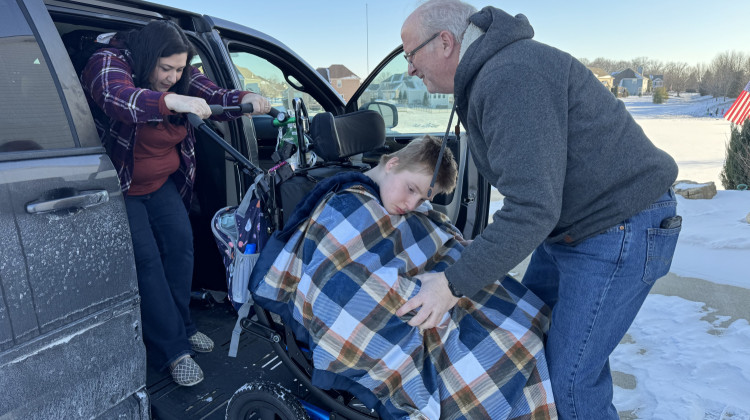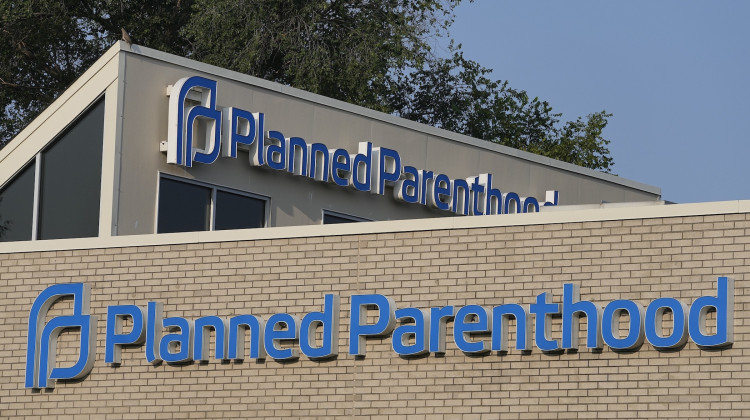
Jackson Dewitt is one of around 1,600 children who receive services through the Attendant Care Program. The stipend his mother, Jennifer, gets for providing around-the-clock care for him helped the family stay afloat.
Elizabeth Gabriel / Side Effects Public Media
This story was last updated on March 2 at 2:38 p.m.
15-year-old Jackson Dewitt has big dimples and a snaggletooth smile. He enjoys listening to music and his mom said he loves giving hugs.
“When I describe him to new nurses when we're in a hospital, I describe him as basically being the human equivalent to Olaf [from the Disney movie Frozen], except that instead of an orange nose, we have red hair,” his mother, Jennifer Dewitt, said.
In 2008, Jackson and his twin brother Matthew were born 13 weeks premature. Jackson had a massive brain bleed that led to severe cerebral palsy.
He is considered blind, unable to eat by mouth, has severe scoliosis, respiratory issues and can have daily seizures due to a severe form of epilepsy. Jackson needs constant care, but it’s difficult for the family to reliably find qualified home health workers due to a dire workforce shortage. So, his mother, Jennifer, provides him with hospital-level care around the clock while also helping Jackson be an active member of the community.
Jackson is one of the nearly 21,000 individuals in Indiana who receive funds through a state Medicaid program called Attendant Care, under the Aged and Disabled Waiver. Around 8% of Attendant Care recipients are children. The program pays legally responsible individuals (often referred to as LRIs) like parents and spouses who care for their disabled and medically complex family members.
But faced with an unexpected $1 billion budget shortfall, the Family and Social Services Administration, which manages Medicaid in Indiana, has proposed to cut these payments as one of several other measures to save money. Families and advocates say these changes could drastically uproot thousands of lives if they go into effect July 2024.
Budget deficit and crippling workforce shortage
Indiana would join at least 11 other states that have recently proposed ending these payments, according to a survey by KFF, a health policy non-profit. In contrast, the data shows 26 other states are transitioning to make this a permanent program, or already have.
James Vaughn, deputy director of communications and public affairs for FSSA, said the cost-cutting measures will help address ballooning expenditures for the Attendant Care Program, which grew from roughly $30 million per month in April 2022 to about $120 million in December 2023. That’s a 300% increase in a little more than a year and a half, and it’s nearly quintupled since July 2020.
“Enrollment on this waiver has grown but not at a pace that really explains the rapid increase in expenditures. It’s been so much more in the space of utilization than enrollment,” said Cora Steinmetz, Indiana Medicaid director, during a Medicaid Advisory Committee meeting on Feb. 22.
In March 2022, 10% of kids received 60 or more hours of Attendant Care per week. In Dec. 2023, that increased to 47%. Some families even claimed 80 to 100 hours per week, according to the FSSA.
Under the Attendant Care Program, caregivers are not directly paid or contracted with the state. Parents and spouses receive the funds through agencies or providers who train and pay them.
Steinmetz added that the FSSA doesn’t “have the transparency or receive the data” that shows how much of the reimbursement goes to the caregiver and how much of it goes to the providers.
The FSSA said the adjustments, which include other cost-cutting measures, could save the state $300 million over two fiscal years.
The changes to the Attendant Care Program wouldn’t allow parents to be LRIs, but other family members could still be paid to provide care. But Jennifer doesn’t want her 21-year-old son Jacob to drop out of college to take care of Jackson.
Now the family is at a crossroads.
FSSA proposed to transition families to a different model called Structured Family Caregiving. Home health workers who are contracted through an agency would still receive the same amount of money they earn through Attendant Care. Around 2,000 people of different ages already receive services through this program.
A big problem is: there aren’t enough providers to meet the need.
Nationwide, the number of home care workers per 100 home and community-based service waivers has declined by more than 11.6% between 2013 and 2019. Over the past few years, FSSA created a direct service workforce plan to help address the recruitment and retention of care providers. FSSA had plans to provide a 2% rate increase for professionals providing services through some Medicaid waiver programs to help boost families’ chances of finding a care provider. But the state changed their minds on that too due to the budget shortfall to save $27 million over the next two years.
If families can’t find a provider, parents would have to take on the responsibility, but at reduced rates. The state would provide up to $133 per day. However, that’s before 30% to 35% of that money is paid to a healthcare agency. After that, parents would only receive about $467 for a five-day work week –– roughly half the amount they receive now, and only possible if they qualify for the highest payment option and receive the max percentage of 65-70% from an agency. But advocates said agencies don’t usually pay that much.
“If the state is saying that they are going to save money by not allowing families to be paid caregivers, that indicates, to me at least, an assumption that they don't think that individuals will get that service,” said Elizabeth Edwards, a senior attorney with the National Health Law Program.

Thousands of livelihoods at stake
In 2023, 15-year-old Jackson was admitted in a hospital for 30 days, had 54 doctor's appointments and over 90 different kinds of therapy appointments. That’s at least one day off from a full-time job each week, and that doesn’t include appointments for Jackson’s twin brother. Over the years, Jennifer has struggled to keep a fulltime job because a nurse would only come three days a week. Other times home health workers either wouldn’t show-up or she couldn’t find one due to the workforce shortage.
With payments through Attendant Care, her family has been able to stay afloat. The Attendant Care Program pays roughly $13-$15 an hour. It’s not much, she said, but it’s helped them survive –– and even thrive.
Jennifer previously slept on the floor of her son’s bedroom because she has to monitor Jackson and make sure he stays connected to machines that help him breathe. But the waiver allowed the family to move into a bigger and more accessible home with room for two beds in his bedroom.
The state previously said that the Attendant Care Program is not going away. The Dewitt’s closed on that new house on Jan. 4. Two weeks later, they were blindsided by the FSSA’s announcement of the proposed changes.
“Maybe I shouldn't have, but I took it to heart that the state was being honest with us. I would have never made the choice to move if I would have known that I was going to lose the biggest portion of my income,” she said.

If the changes go into effect, Jennifer would have to provide hospital-level care at a much lower rate. She worries they may also lose their house. Single parents and families in rural areas would lose a lifeline, she said.
“I’m a mom and I understand that there's not an infinite number of dollars available,” Jennifer said. “But I also believe that as a humane country, we also need to take care of those that can't take care of themselves.”
Some families are scared they’ll have to put their children in one of Indiana’s four long-term care facilities for kids with disabilities. Not only would this mean kids would receive care outside of their home, but also half of those facilities are near capacity.
The lieutenant governor, House Democrats and the Intellectual and Developmental Disabilities Task Force have said FSSA shouldn’t move forward with the proposed changes due to a limited amount of data. House Republican lawmakers have also introduced amendments to a bill dealing with state fiscal matters that would increase the FSSA’s reporting requirements to legislators, including expenditure and enrollment data twice every year.
For now, Kate Barrow, the executive director of the Indiana Governor’s Council for People with Disabilities, said she’s concerned families might make decisions out of fear.
“I’ve heard of families that are considering signing over their parental rights for their children in order to remain the caregiver,” she said.
Advocates say it could be a month before FSSA makes a final announcement.
UPDATE: On Feb. 29, lawmakers approved a series of amendments to Senate Bill 256. These amendments would do the following:
- increase the stipend that agencies reimbursed by Medicaid pass on to the families of disabled loved ones under the structured family caregiving program. The amendment requires at least 80% of the money be passed on to families.
- require FSSA to apply for a Medicaid waiver that would either establish a higher reimbursement rate for families of disabled loved with “extraordinary” needs, or allow legally responsible individuals like parents and spouses to continue to provide care for those individuals under the current attendant care structure the FSSA is proposing to eliminate.
It’s unclear how much of these amendments will stay as the House and Senate negotiate these changes.
Contact WFYI’s health reporter Elizabeth Gabriel at egabriel@wfyi.org.
Side Effects Public Media is a health reporting collaboration based at WFYI in Indianapolis. We partner with NPR stations across the Midwest and surrounding areas — including KBIA and KCUR in Missouri, Iowa Public Radio, Ideastream in Ohio and WFPL in Kentucky.
 DONATE
DONATE






 Support WFYI. We can't do it without you.
Support WFYI. We can't do it without you.